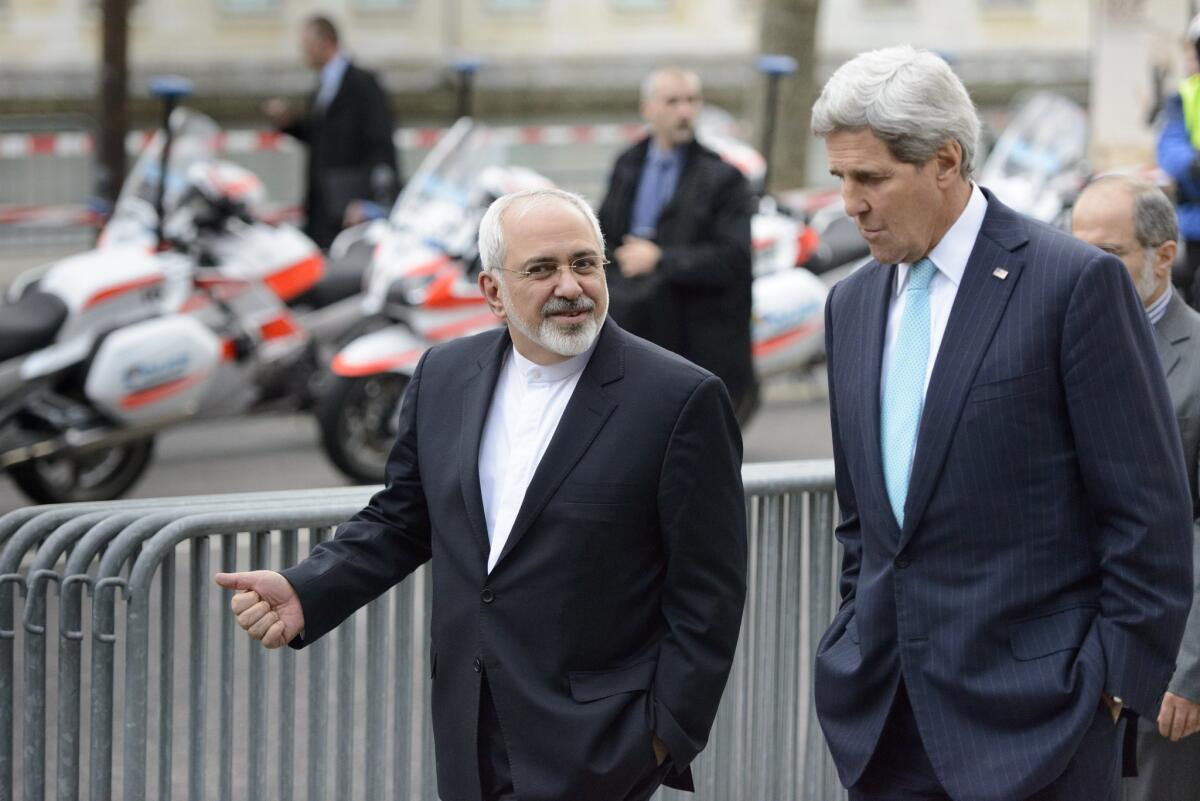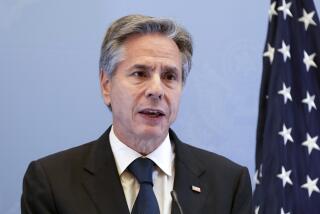U.S. says Iran negotiations ‘far more advanced’

Nuclear negotiations with Iran have reached a “far more advanced stage” than ever before, a senior administration official said Friday, expressing hope that negotiators may be able to conclude a partial agreement by the end of March.
While “there are still gaps” between Iran, the United States and the five other world powers involved in the negotiations, the official said, “obviously negotiations have advanced substantially.”
The administration official’s comments came in a conference call with reporters. The official declined to be identified, citing ground rules often invoked by the administration.
Diplomats have been negotiating for about a year, seeking a deal that would ease sanctions on Iran’s economy if it agrees to restrict its nuclear activities.
They have been seeking to complete a so-called framework agreement by the end of March, and then to negotiate all the details by the end of June.
Talks were extended twice last year, and the administration is under growing pressure to finish soon. Many U.S. lawmakers want to hit Iran with new penalties if it fails to agree to a deal by the end of March.
Administration officials have been sending out conflicting signals in recent days, with some claiming a deal is close and others insisting the chances of reaching an agreement are only 40%.
Some private groups that advocate a deal -- and others that oppose an agreement -- are predicting that a deal is near.
Secretary of State John Kerry, in appearances before Congress this week, was cautious in his predictions, saying that substantial differences remain between the two sides. He urged lawmakers to ignore news reports that purport to disclose details about the negotiations, saying those key points are in flux.
Diplomats say progress has been made on the core issue of how much capacity to enrich uranium Iran would retain in a deal. After months of impasse on that question, the two sides are considering a proposal that could allow Iran to keep around 6,500 centrifuges -- far more than earlier proposals -- if it accepts other provisions aimed at reducing its production and stockpile of uranium.
Critics of the emerging deal have said that such a large number of centrifuges would allow Iran to quickly make bomb-grade fuel. Defenders of the proposal say that the key issue is not the number of centrifuges, but the amount of enriched uranium Iran has. Reducing that stockpile would make up for the greater number of centrifuges, they say.
The two sides also appear to be groping toward a compromise on a long-standing dispute over how many years a deal would last, diplomats say. They have discussed a proposal that would roll back Iran’s sensitive nuclear activities for 10 years, then gradually ease up on the restrictions for the following five years.
Other obstacles remain, such as the issue of how soon the U.S., European and United Nations sanctions against Iran would be lifted.
Iran continues to push hard for immediate sanctions relief, while the U.S. and its allies insist sanctions should be reduced gradually and only as Iran demonstrates it will live up to the agreement.
Kerry is traveling to Montreux, Switzerland, for a Tuesday meeting with Iranian Foreign Minister Mohammad Javad Zarif on the nuclear issue.
Kerry will again be accompanied by Energy Secretary Ernest Moniz, a sign that the talks are delving deep into the details of a possible agreement. The Energy Department oversees the U.S. nuclear stockpile and employs the government’s experts on nuclear fuel.
The senior administration official told reporters not to expect the announcement of a deal in the coming week, however.
The negotiating effort is expected to come under sharp attack on Tuesday, when Israeli Prime Minister Benjamin Netanyahu addresses a joint session of Congress. Netanyahu says he will warn lawmakers to prevent completion of the deal, which he says would allow Iran to gain a nuclear weapons capability.
For foreign policy news, follow @richtpau on Twitter.
More to Read
Start your day right
Sign up for Essential California for news, features and recommendations from the L.A. Times and beyond in your inbox six days a week.
You may occasionally receive promotional content from the Los Angeles Times.







